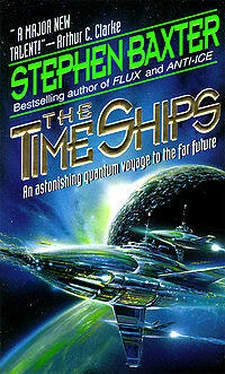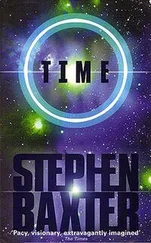“Nebogipfel — about your face. I — you have to understand…”
He regarded me from his one good eye. I saw he had reverted to his Morlock mannerisms, losing the human coloration he had adopted. “ What? What must I understand?”
“I didn’t mean to injure you.”
“You do not now,” he said with a surgeon’s precision. “But you did then. Apology is futile — absurd. You are what you are… we are different species, as divergent from each other as from the Australopithecines.”
I felt like a clumsy animal, my huge fists stained once more with the blood of a Morlock. “You shame me,” I said.
He shook his head a brief, curt gesture. “Shame? The concept is without meaning, in this context.”
I should no more feel shame — I saw he meant — than should some savage animal of the jungle. If attacked by such a creature, would I argue the morals of the case with it? No — without intelligence, it could not help its behavior. I should merely deal with its actions.
To Nebogipfel, I had proved myself — again! — to be little better than those clumsy brutes of the African plains, the precursors of men in this desolate period.
I retreated to the wooden benches. I lay there, cradling my aching head with my arm, and watched the flicker of Ages beyond the still-open door of the car.
The bleak, wintry cold passed, and the sky took on a more complex, mottled texture. Occasionally the rocking sun-band would be blotted out by a shell of dark cloud, for as long as a second. New species of trees flourished in this milder climate: deciduous types, as best I could make out, maple, oak, poplar, cedars and others. Sometimes these antique forests lapped over the car, shutting us into a twilight of flickering green-brown, and then they receded, as if a curtain had been drawn aside.
We had entered a time of powerful earth movements, Nebogipfel said. The Alps and Himalayas were being forced out of the ground, and immense volcanoes were spewing ash and dust into the air, sometimes obscuring the sky for years on end. In the oceans — the Morlock said — great sharks cruised, with teeth like daggers. And in Africa, the ancestors of Humanity were shriveling back into primitive mindlessness, with shrinking brains, stooping gait and blunted, clumsy fingers.
We fell through that long, savage Age for perhaps twelve hours.
I tried to ignore the hunger and thirst that clawed at my belly, while centuries and forests flickered past the cabin. This was the longest journey through time I had taken since my first plunge into the remote future beyond Weena’s History, and the immense, futile emptiness of it all — for hour after unchanging hour — began to depress my soul. Already the brief flourishing of Humanity was a remote sliver of light, far away in time; even the distance between man and Morlock — of whatever variety — was but a fraction of the great distance I had traveled.
The hugeness of time, and the littleness of man and his achievements, quite crushed me; and my own, petty concerns seemed of absurd insignificance. The story of Humanity seemed trivial, a flash-lamp moment lost in the dark, mindless halls of Eternity.
The earth’s crust heaved like the chest of a choking man, and the Time-Car was lifted or dropped with the evolving landscape; it felt like the swell of an immense sea. The vegetation grew more lush and green, and new forests pressed up against the Time-Car — I thought they were deciduous trees by now, though flowers and leaves were reduced to a uniform green blur by our velocity — and the air grew warmer.
The ache of those eons of cold left my fingers at last, and I discarded my jacket and loosened the buttons of my shirt; I abandoned my boots and flexed the circulation back into my toes. Barnes Wallis’s numbered security badge fell out of my jacket pocket. I picked it up, this little symbol of man’s suspicious fencing-off of his fellow man, and I do not think I could have found, in that primeval greenness, a more perfect symbol of the narrowness and absurdity on which so much human energy is wasted! I threw the badge into a dark corner of the car.
The long hours, suspended in that cloaking greenery, passed more slowly than ever, and I slept for a while. When I woke, the quality of the greenness around me seemed to have changed — it was more translucent, with something of the shade of Plattnerite, and I thought I saw a hint of star-fields — it was like being immersed in emeralds, rather than leaves.
Then I saw it: it hovered in the moist, gloomy air of the cabin, immune to the rocking of the car, with its huge eyes, fleshy “V” of a mouth, and those articulated tentacles which trailed towards, but did not touch, the floor. This was no phantasm — I could not see through it, to details of the forest beyond — and it was as real as me, Nebogipfel, or the boots I had set on the bench.
The Watcher regarded me with a cool analysis.
I felt no fear. I reached out towards it, but it bobbled away through the air. I had no doubt that its gray eyes were fixed on my face. “Who are you?” I asked. “Can you help us?”
If it could hear, it did not respond. But the illumination was already changing; that light-suffused quality of the air was fading back to a vegetable greenness. I caught a sensation, then, of spinning — that great skull was like some improbable toy, turning on its axis — and then it was gone.
Nebogipfel walked up to me, his long feet picking over the floor’s ribs. He had discarded his nineteenth-century clothes, and he went naked, save for his battered goggles and the coat of white hair on his back, now tangled and grown out. “What is it? Are you ill?”
I told him of the Watcher, but he had seen nothing of it. I returned to my rest on the bench, uncertain if what I had witnessed was real — or a lingering dream.
The heat was oppressive, and the air in the cabin grew stifling.
I thought of Gödel, and of Moses.
That unprepossessing man, Gödel, had deduced the existence of Multiple Histories, purely from ontological principles — while I, poor fool that I am, had needed several trips through time before the possibility had even occurred to me! But now, that man who had dreamed his magnificent dreams of the Final World, a world in which all Meaning is resolved, lay crushed and broken under a heap of masonry killed by the narrowness and stupidity of his fellow men.
And as for Moses: for him, I simply grieved. It was something of the desolation one might feel if a child is killed, I think, or a younger brother. Moses was dead at twenty-six; and yet I — the same person — breathed on at four-and-forty! My past had been cut out from under me; it was as if the ground had evaporated, leaving me stranded in the air. But beyond this I had come to know Moses, if briefly, as a person in his own regard. He had been cheerful, erratic, impulsive, a little absurd — just like me! — and immensely likable.
It was another death on my hands!
All Nebogipfel’s double-talk of a Multiplicity of Worlds — all the possible arguments that the Moses I had known was never, in the end, destined to be me, but some other variant of me — none of that made any difference to the way it felt to have lost him.
My thoughts dissolved into half-coherent fragments — I struggled to keep my eyes open, fearing I should not wake again — but, once more, consumed by confusion and grief, I slept.
I was woken by my name, pronounced in the Morlock’s odd, liquid guttural. The air was as foul as before, and a new throb, caused by the heat and lack of oxygen, was jostling for room in my skull with the residue of my earlier injuries.
Читать дальше
Конец ознакомительного отрывка
Купить книгу









